Stormwater

The U.S. EPA’s National Pollutant Discharge Elimination System (“NPES”) permit program (Program) administered by the Nebraska Department of Energy and Environment (“NDEE”) requires that cities meeting certain demographic and environmental impact criteria obtain from the NDEQ an NPDES permit for the discharge of storm water from a Municipal Separate Storm Sewer System (MS4)(MS4 Permit). The City of North Platte (City) is subject to the program and is required to obtain, and has obtained an MS4 permit; the city’s MS4 permit is on file at the office of the City Clerk and is available for public inspection during regular office hours. The City Council approved the Stormwater Management Program (SWMP) to abide by the NPDES permit and the NDEE has approved the SWMP.
Municipal Separate Storm Sewer System (MS4)
Stormwater from our community is transferred directly from our inlets and ditches to our lakes, streams, and rivers. Stormwater effectively accumulates and transfers pollutants. Many of these pollutants are efficiently stopped by following preventive measures and avoiding these sources of stormwater pollution:
- Changing motor oil on impervious driveways
- Improperly disposing leftover paint and household chemicals and lawn chemicals
- Leaking trash containers
- Littering
- Operating vehicles that leak fluids
- Pet waste
- Washing cars on pavement
- Dumping of restaurant waste including food, wastewater or oil/grease.
Citizen cooperation is necessary to ensure that the City of North Platte is doing its part to comply with EPA mandated requirements.
Stormwater Management Plan (SWMP)
The SWMP has six Minimum Control Measures (MCMs) which must be followed to be in accordance with the NPDES permit. They are:
- Education and Outreach
- Public Involvement and Participation
- Illicit Discharge Detection and Elimination
- Construction Site Stormwater Runoff Control
- Post Construction Stormwater Management
- Pollution Prevention Good Housekeeping
Below is a flyer that has been mailed to City Customers:
Illicit Discharge Incident
Illicit discharge is any intentional or unintentional dumping of any substance prohibited by the City’s most current MS4 Permit requirements. Generally, storm water, fire suppression water, or prior approved dewatering water are allowed into a municipal storm drainage system. All citizens are encouraged to report incidents involving illicit discharge and activities related to illegal dumping.
Illicit Discharge – City Ordinance
What to do if I see an Illicit Discharge?
It is imperative that illicit discharges be detected, reported and corrected as early as possible. If you see or suspect illegal dumping or illicit discharges into the City’s drainage system, please call the Public Service (308) 535-2457 or City Engineering (308) 535-6724. Also, you can email the City at info@ci.north-platte.ne.us. Please put “Urgent” in subject line. If possible, tell the employee what is being dumped, the time of day, the location of the illicit dumping and (if applicable) a license plat of the vehicle or trailer involved.
Storm Water Discharges from Construction Sites to Water of the State of Nebraska
The Nebraska Department of Energy and the Environment has an online process for applying for Construction Water discharge
This permit is required and shall apply to storm water or non-storm water discharges associated with construction activity that causes land disturbance of equal to or greater than one acre and less than one acre if the construction activity is part of a common plan of development or sale. All references in this permit to construction activity shall be read to include both large construction activity and small construction activity. This permit authorizes the discharge of storm water from construction activity entering Waters of the State, a municipal separate storm sewer system (MS4), or a combined sewer system (CSO) within the State of Nebraska. Discharges are subject to the specific terms and conditions in this permit.
Construction Storm Water Online Permit
Post Construction – Stormwater Treatment Facilities (STF)
STF’s are permanent Best Management Practices (BMP’s) put in place to provide control and treatment of stormwater runoff after construction for land development is complete. They are sometimes referred to as “Structural BMP’s”. The process for determining the size of the STF calculations used for water quality control volume (WQCV) or water quality discharge rate (Qwq). A site qualifies if it:
- Is inside City limits AND
- Disturbed area is greater than 1 acre
- It was re-platted after June 1st, 2018 OR was preliminarily platted after June 1st, 2018
Below is a link for a guidance on calculating the above generated by Nebraska H20 and utilized by communities in Nebraska.
Storm Water Treatment Facility Calculations
GENERAL INFORMATION AND HELPFUL LINKS
Polluted Runoff: Nonpoint Source (NPS) Pollution
EPA Storm Water Rules and Notices
FOR CONTRACTORS
State of Nebraska NPDES Permit for Storm Water Discharges from Construction Sites
NDEE – Online Application Process
EPA Storm Water Pollution Prevention Plan Examples
EPA Construction Program Overview
Construction Industry Compliance Assistance Center
NPDES Permit Authorizing Dewatering Discharges
The Nebraska Department of Transportation (NDOT) has very useful information for education, training, and Nebraska acceptable BMP’s.
Stormwater Management – Nebraska Department of Transportation
LAWN & GARDEN
University of Nebraska-Lincoln Extension Landscapes
Water Pollution and Our Own Yard
Rain Garden Design – University of Nebraska
AUTOMOTIVE
A Guide for Recycler Owners and Operators
FOOD SERVICE INDUSTRY
Food Manufacturing Pollution Prevention Techniques




